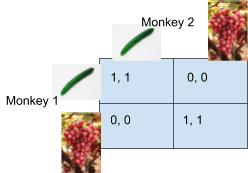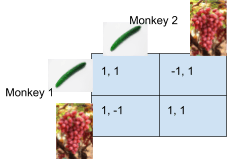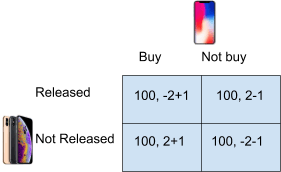Game Theory in Parenting and Daily Life
https://well.blogs.nytimes.com/2016/07/05/when-a-child-thinks-life-is-unfair-use-game-theory/
This article’s topic connects what we learned in class with our daily life. Game theory not only is significant in politics and economics, but also helps parents to educate their children. Game Theory, as the author mentioned, is directly related to the problem of fairness. For example, when dividing things among several children, when assigning jobs to children …. The author suggested some methods to solve the problem of feeling unfair, such as “random dictator”, “auction”, and “I cut, you pick”….This corresponds to the game theory we talked about in class because children may think the prize others received is better than the ones they received. The results others get may affect their feelings as well as the results they get. For example, as mentioned in the article, a monkey was pleased with a piece of tasty cucumber as a prize until her saw her peer rewarded with a tasty grape. A tasty grape may not necessarily better than a piece of cucumber. However, knowing the fact her peer has something differs with hers, the monkey feels angry and throws her cucumber away (the figure on the right shows their relationship). Number 1 stands for being happy, and number 0 stands for no effect.
Firstly, there are many similarities and common points in parenting and the game theory we have learned. According to the diagram above, we can conclude that there is a pure strategy Nash Equilibrium in this situation. In order to achieve better moods for the monkeys, the handler should give them the same “reward”. In another circumstance, we assume that grape is a better reward than cucumber and we have the diagram below. 1 represents happy mood, and -1 represents angry mood. In this situation, the difference between the two selections is significant. Parents, in order to teach children the idea of fairness, would be better to reward children with the same award to prevent fight and envy between them.
Secondly, in another point of view, both of the monkeys have no right to select which reward they would like to have. It is the handler, the person, who chooses the prize for them. In this case, there is a transparent hand manipulating the response of the two monkeys. Parents also can teach their children via a way like this. Besides the benefit game theory has on parenting, it sometimes is used as a means to manipulate people, which may not be ideal for a society. In reality, there are so many circumstances we do not have choice or right to choose, and instead, someone chooses for us. They are using game theory to manipulate us. For example, several days after person A got a new IPhone X, he found that IPhone XS and IPhone XR are released (assume the payoff of Apple company does not affected). He felt regret because he could have waited several more days to get a better looking IPhone. Having the new IPhone X may not make you happy, but makes you regretful. According to the figure in the left, 1 represents 1 degree of happiness, and -1 represents 1 degree of sadness; 2 represents 2 degrees of happiness and -2 is 2 degrees of sadness. The sum of each cell is the total happiness gained my the person. This is how other people can manipulate our happiness through game theory. We can choose buy or not buy, but Apple company’s choice affect our payoff.
